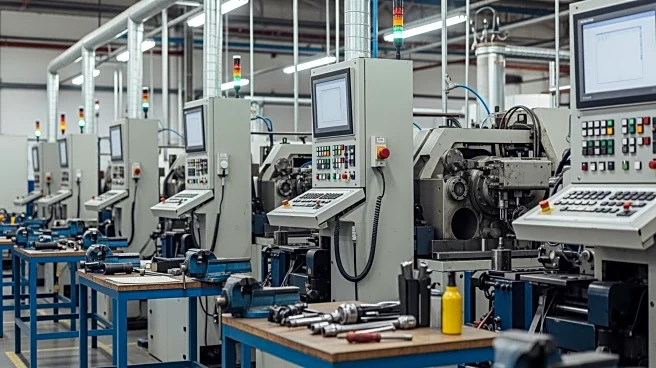What's Happening?
Midlands manufacturers are facing significant challenges, including Brexit-related trade complexities, rising energy costs, and skills shortages. At a recent roundtable in Birmingham, industry leaders
emphasized the need for coordinated government action to support the sector. The discussion highlighted the impact of Brexit on cross-border trade, with increased costs and supply chain delays. Rising energy costs, driven by new legislation, pose existential threats to smaller manufacturers. The drive towards net zero, while supported, raises concerns about competitiveness and potential offshoring. Skills shortages and the future of apprenticeships were also discussed, with calls for clarity on government policy to encourage investment in training.
Why It's Important?
The Midlands manufacturing sector is crucial to the UK's industrial landscape, and its challenges have broader implications for the economy. Brexit-related trade issues and rising energy costs could lead to increased prices for consumers and potential closures of smaller firms. The push for net zero, while environmentally beneficial, may impact competitiveness and lead to offshoring. Skills shortages affect workforce development and innovation, crucial for maintaining industry growth. Government action is needed to provide stability, competitive energy pricing, and investment in skills to ensure the sector's survival and growth.
What's Next?
Industry leaders are calling for the government to prioritize creating a stable tax environment, competitive energy pricing, and investment in skills and regional innovation. There is a need for more joined-up thinking across government departments and listening to industry voices. The focus should be on supporting manufacturing without imposing burdensome regulations or taxes. The sector's future depends on strategic government support to navigate current challenges and foster growth.
Beyond the Headlines
The discussion at the roundtable highlights the need for pragmatic leadership that balances environmental goals with economic survival. The potential offshoring due to net zero policies could have long-term impacts on the UK's manufacturing competitiveness. Skills development and retention are critical for sustaining industry innovation and growth. The government's approach to R&D tax credits and investment incentives needs to be more supportive of smaller firms to encourage innovation.









